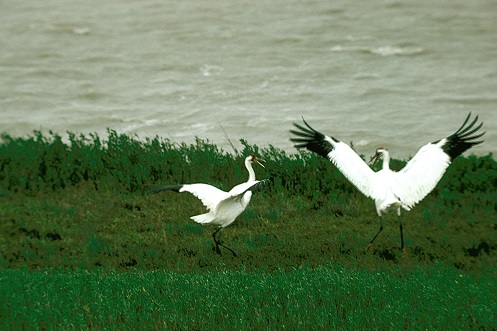Wildlife: Whooping Crane Recovery Update
Thursday, December 5th, 2013This is Passport to Texas
Parks and Wildlife biologist, Leeann Linam, has a long history with Whooping Cranes.
11— [chuckles] well, I may age myself here, but we moved to the Aransas National Wildlife Refuge when I was 12. And so I guess that means about 40 years or so I’ve been involved with whooping cranes.
Whoopers winter at the refuge, where Leeann’s father worked for the US Fish and Wildlife Service. Yet, after 70 years of conservation—and a low of 15 birds—there are still fewer than 300 members in the migrating population.
24 – Part of it is the nature of the animal, itself. Whooping cranes are one of these birds designed to be around for a long time. They live 25 to 30 years and more (in captivity). They don’t reproduce until they’re four or five years old; they usually only raise one chick successfully per year. So it just takes a while. You just have to be patient and provide the right conditions for a long time and then the numbers start to add up.
As their population increases and becomes more widespread, maintaining an accurate tally of the birds becomes a challenge. Whoopers are moving farther up the coast away from their traditional wetland habitat.
07 – Some in the rice country in Horton County and most interestingly, in Central Texas, we’ve had some whooping cranes wintering in Williamson County.
Tomorrow: where to see migrating whoopers.
The Wildlife and sport fish restoration program supports our series and funds diverse conservation programs in Texas…
For Texas Parks and Wildlife…I’m Cecilia Nasti.



 Passport to Texas is a
Passport to Texas is a  Passport to Texas is made available by:
Passport to Texas is made available by: